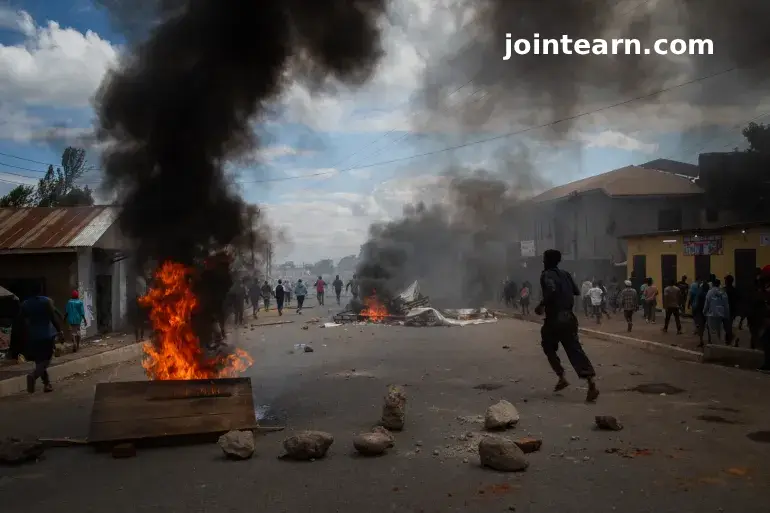
Dar es Salaam, Tanzania — October 31, 2025
Tanzania’s opposition has accused the government of unleashing a deadly crackdown following the country’s disputed general elections, claiming that hundreds of people have been killed in nationwide protests. The unrest marks one of the bloodiest post-election periods in Tanzania’s modern history, highlighting deep divisions over democracy, governance, and political freedom.
Opposition Claims “Hundreds Killed” in Deadly Protests
The Chadema opposition party said that approximately 700 people were killed after security forces opened fire on demonstrators across multiple cities.
“As we speak, the number of deaths in Dar es Salaam is around 350 and there are more than 200 in Mwanza,” said John Kitoka, Chadema’s spokesperson, in comments to AFP. “If we add the figures from other parts of the country, we arrive at around 700 deaths.”
The opposition said its tally came from members who toured hospitals and morgues nationwide. A separate security source cited by AFP provided a similar estimate, suggesting the death toll could be substantially higher than official figures.
By contrast, the United Nations reported that it had verified at least 10 deaths, while expressing alarm over “credible reports of excessive use of force” by Tanzanian security forces.
“We call on the security forces to refrain from using unnecessary or disproportionate force, including lethal weapons, against protesters,” said Seif Magango, spokesperson for the UN Human Rights Office, during a briefing in Geneva.
Widespread Protests and Internet Shutdown
The protests erupted Wednesday after the October 29 elections, which many citizens and human rights groups denounced as neither free nor fair. Demonstrations spread rapidly across the commercial hub of Dar es Salaam and into other regions, including Arusha, Mwanza, and Dodoma.
Witnesses reported burning vehicles, torched police stations, and street barricades, as thousands of young protesters clashed with heavily armed police and military units.
The government responded by imposing a curfew, deploying the Tanzanian People’s Defence Force (TPDF), and enforcing an internet shutdown, effectively cutting off social media access and independent reporting.
“People are angry,” said a Dar es Salaam resident who asked to remain anonymous. “We feel like our votes don’t matter. The government has silenced everyone.”
Opposition Leaders Targeted, Candidates Barred
This year’s election was marred by harassment, disqualification, and arrests of opposition leaders. The Independent National Electoral Commission (INEC) had barred major opposition candidates, including Tundu Lissu of Chadema and Luhaga Mpina of ACT-Wazalendo, citing technical and legal objections.
Lissu, who previously survived an assassination attempt, was arrested in April after demanding electoral reforms and later charged with treason.
President Samia Suluhu Hassan, who took office in 2021 after the death of former President John Magufuli, faced only minor challengers, virtually ensuring her victory and extending the Chama Cha Mapinduzi (CCM) party’s six-decade rule since independence.
International observers, including the United Nations and Human Rights Watch, had warned for months of an escalating crackdown on dissent.
A June UN report documented over 200 enforced disappearances since 2019, while Human Rights Watch reported new cases of torture, abduction, and political harassment as recently as September.
“The authorities need to stop muzzling dissenting voices and instead ensure free and fair elections,” said Nomathamsanqa Masiko-Mpaka, HRW’s South Africa researcher.
Zanzibar Elections Marred by “Massive Fraud” Allegations
The semi-autonomous island of Zanzibar, historically a flashpoint during Tanzanian elections, remained tense under heavy military presence. The Zanzibar Electoral Commission announced that incumbent President Hussein Mwinyi won 78.8% of the vote — a result the opposition dismissed as “massively fraudulent.”
Opposition leaders vowed to challenge the results and threatened to reveal “the next steps” if their grievances were ignored.
Growing Concerns Over Democratic Backsliding
Analysts say the 2025 elections underscore Tanzania’s democratic decline under President Hassan, once hailed as a moderate reformer. Her administration has since been accused of tightening control over civil society, restricting media freedom, and criminalizing political opposition.
The unrest in Tanzania follows a series of contested elections across Africa, including recent disputes in Ivory Coast and Cameroon, where long-serving leaders faced public backlash over extended rule.
“What’s happening in Tanzania fits a wider pattern across the continent,” said Dr. Abdi Mahmud, a political analyst at the University of Nairobi. “Leaders use legal and security systems to entrench power while silencing legitimate political competition.”
Government Response and Military Deployment
In a televised address, Army Chief Jacob John Mkunda condemned the violence and pledged to “restore calm.” He said the military was coordinating with police to “protect lives and property.”
Meanwhile, the government announced the postponement of university and college reopenings, citing ongoing instability. State media continues to broadcast election results, declaring a sweeping victory for CCM across mainland Tanzania.
Despite official reassurances, human rights groups and foreign governments have demanded an independent investigation into the alleged killings and mass arrests.


Leave a Reply